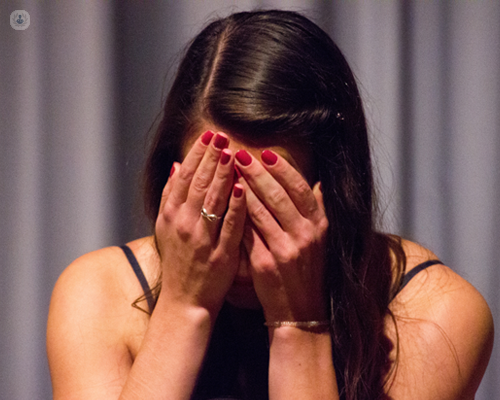What triggers rosecea?
Written in association with:
Rosacea is a chronic skin condition characterised by redness, visible blood vessels, and sometimes small, red, pus-filled bumps on the face. The exact cause of rosacea is not fully understood, but several factors can trigger or worsen the condition. These triggers vary between individuals but often include. Find out more in this article by leading consultant dermatologist Dr N. Hari Krishna Reddy.

Environmental factors
- Sun exposure: One of the most common triggers, UV rays can aggravate rosacea, leading to flare-ups.
- Cold weather: Wind and cold can cause irritation and make the symptoms of rosacea worse.
- Heat and humidity: Hot weather, as well as indoor heating, can cause blood vessels to dilate, resulting in facial redness.
Dietary triggers
- Spicy foods: Consuming spicy foods can lead to flare-ups due to increased blood flow to the face.
- Hot drinks: Beverages like tea and coffee can trigger rosacea, not only due to heat but also from certain compounds in the drinks.
- Alcohol: Particularly red wine, alcohol can dilate blood vessels, which can lead to redness and exacerbate symptoms.
Emotional factors
- Stress: Emotional stress and anxiety are known to be major triggers of rosacea.
- Embarrassment or anger: Strong emotions can cause facial flushing, which might worsen the condition.
Medical and physical triggers
- Exercise: Physical activity, especially vigorous exercise, increases blood flow, which may worsen facial redness.
- Certain medications: Drugs that dilate blood vessels, such as some blood pressure medications, can cause flare-ups.
- Cosmetic products: Harsh skincare products, especially those containing alcohol, fragrances, or other irritants, can exacerbate rosacea.
Other triggers
- Hormonal changes: Menopause, hormonal fluctuations, or pregnancy can trigger rosacea due to increased blood flow and sensitivity.
- Demodex mites: These tiny mites, which naturally live on the skin, are more prevalent in people with rosacea and might contribute to flare-ups.
Identifying personal triggers can help in managing and reducing flare-ups, and dermatologists often suggest keeping a diary to track potential triggers.
How is rosacea treated?
While there is no definitive cure for rosacea, there are various treatments available that can help manage and reduce its symptoms. Treatment depends on severity and specific symptoms. Some of the most common treatments include:
- Topical medications: Doctors often prescribe topical creams or gels that help reduce inflammation, redness and acne. These may contain ingredients such as metronidazole, azelaic acid, or ivermectin.
- Oral antibiotics: For moderate to severe cases, oral antibiotics like doxycycline may be used to reduce inflammation and treat any associated bacterial infections.
- Laser therapy: Laser and light-based treatments can target visible blood vessels and reduce facial redness. These treatments are particularly effective for individuals with persistent redness and broken blood vessels.
- Skincare: Gentle, non-irritating skincare routines are essential for people with rosacea. Dermatologists recommend using mild cleansers and moisturisers, avoiding alcohol-based products or any harsh ingredients that can exacerbate symptoms.
- Lifestyle changes: Managing triggers is key to controlling flare-ups. This may involve avoiding sun exposure, using sunscreen, adjusting diet and minimising stress. Patients are often advised to keep a journal to track any potential triggers, such as certain foods or environmental factors.
Can rosacea be cured?
Currently, there is no cure for rosacea, but the condition can be effectively managed with proper treatment. With a combination of medical therapies, skincare routines and lifestyle adjustments, many people can significantly reduce their symptoms and prevent flare-ups. Early diagnosis and treatment are crucial in preventing the condition from worsening. Regular follow-ups with a dermatologist can also help fine-tune treatment plans and ensure the best possible outcome.
Rosacea is a chronic condition, and while it may go into remission, it can also flare up periodically throughout a person's life. Managing triggers, adhering to a treatment plan, and maintaining a gentle skincare routine can help keep the condition under control and improve overall skin health.
Do you require expert rosacea treatment? Arrange a consultation with Dr Reddy via his Top Doctors profile.


